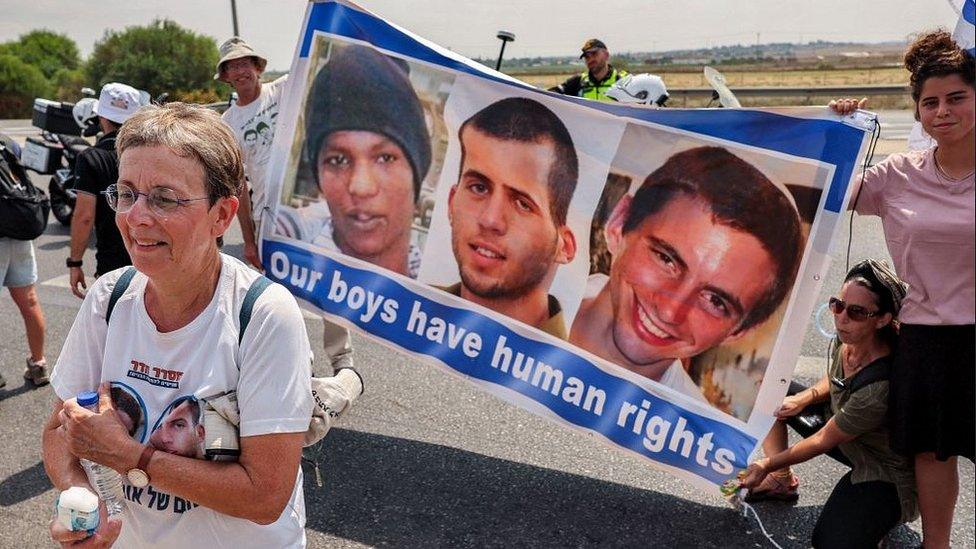'Hamas said they wouldn’t shoot, then murdered my daughter’
- Published
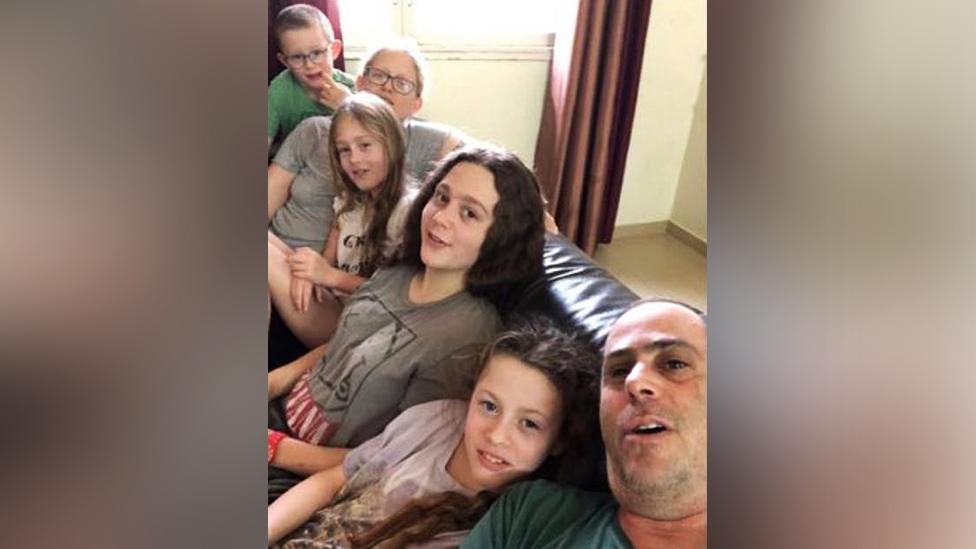
The Idan family - Maayan, centre, was killed in the attack and her father, Tsachi sitting far right, was abducted
Warning: This article contains details that some readers may find disturbing
As Tsachi Idan was driven away to Gaza, his hands were still covered with his daughter's blood.
He wasn't allowed to wash them after cradling 18-year-old Maayan, who was murdered in front of her family by a Hamas gunman.
Nor was he able to wipe them clean before he used his body to shelter his two youngest children, as the sound of explosions ripped through the air outside their home.
And throughout the ordeal, Hamas rigged up a phone to broadcast the family's pain and terror to the world on Facebook Live.
Gali Idan, Tsachi's wife, is now far away from their beloved Nahal Oz, one of the many southern Israeli communities attacked by Hamas on 7 October.
She and her surviving children are being looked after in a different kibbutz, surrounded by care and comfort. But it isn't home.
Home is the place the family had lived in since Maayan was four years old. It's the house where they'd grown and made memories together, and where her younger brother and sisters had been born.
Maayan, the eldest child, was mature, and shy. "She was perfect," their neighbour told me. She had just passed her driving test, and had her first boyfriend. She loved to read, and asked for books for her birthday just four days before she was killed. As Gali says, now, she'll forever be 18.
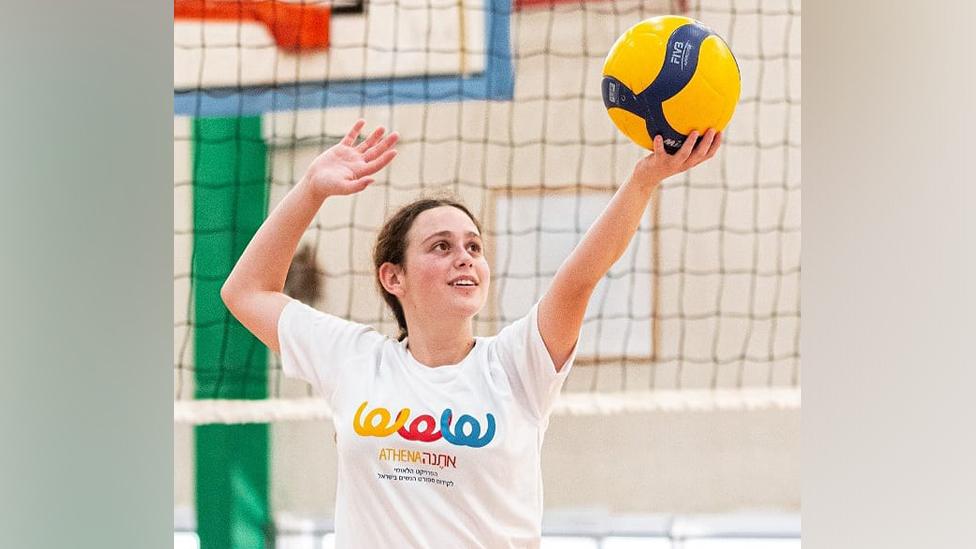
Maayan Idan, a keen volleyball player, had turned 18 just days before her family came under attack by Hamas
Sitting in a shaded spot underneath the citrus trees, Gali says she doesn't want to recount the pain of that day - it's too raw - but she's doing it for Tsachi.
"I want him back. Whole, and alive. I want him back now."
On 7 October, the family woke to the sound of red alert alarms, warning of rocket fire from Gaza. They knew what to do. But that morning, something was different.
"It was unusual and very intense," Gali tells me. "It was a barrage. Barrage after barrage. We couldn't even go out and breathe. We closed ourselves in the mamad, our sheltered room inside our home."
"Tsachi and I looked at each other and said that something here isn't right. Something was horrifying.
"We got messages on the internal system of the kibbutz that we were under attack, and that we needed to stay inside the mamad. At some point they told us to be quiet, that there was likely an infiltration of terrorists within the kibbutz," she continued.
"You need to understand that this is something that was never an option, ever. It was always the nightmare of nightmares, but there was always a solution from the state or the security forces to that situation. And suddenly, it was real. The nightmare was real."
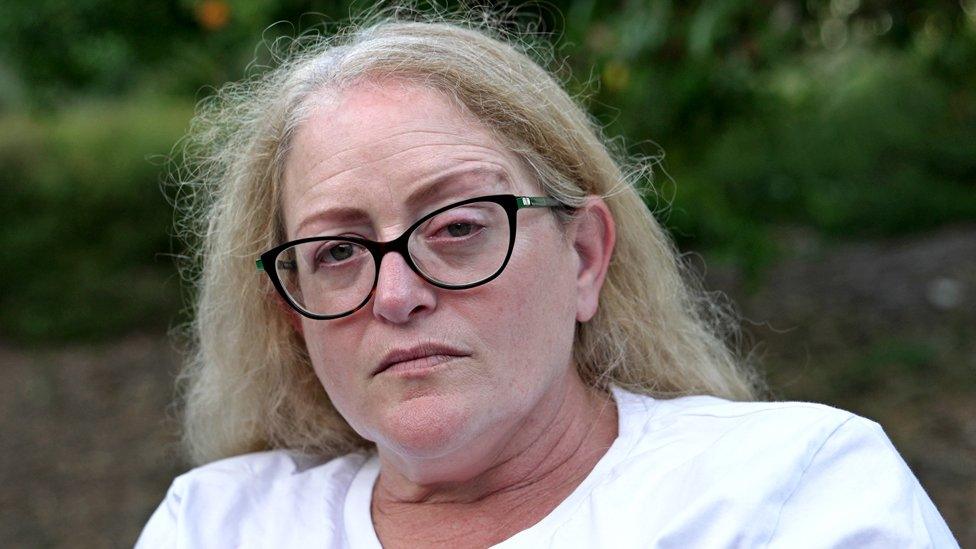
Gali says her daughter Maayan was killed whilst trying to prevent Hamas from entering the family's safe room
Gali describes how - at that moment - something exploded outside the house, shattering the glass windows. Then came the sound of footsteps and voices inside their home. A man shouted in accented English, "we don't shoot".
But they did.
"Tsachi held onto the door and didn't let them open it," Gali continues. "There's no lock on it and the kids are screaming and there's crazy chaos inside the room. It's dark, but then Maayan understood."
"She saw that they were able to open the door just a bit. And so she jumped up and helped Tsachi to grab the door."
Gali's tears start to fall, but she keeps on describing that moment.
"They're screaming 'we don't shoot', and then they shot. Tsachi yelled 'who's been hit, who's been hit?' And it was Maayan. She fell next to him, and then Hamas were able to open the door. There were screams, and they turned on the light."
"Maayan was in a huge puddle of blood. I checked her and realised she'd been hit in the head, and she was critically wounded. They yelled to us to get out of the mamad. We just told the kids 'don't look', and I led them out."
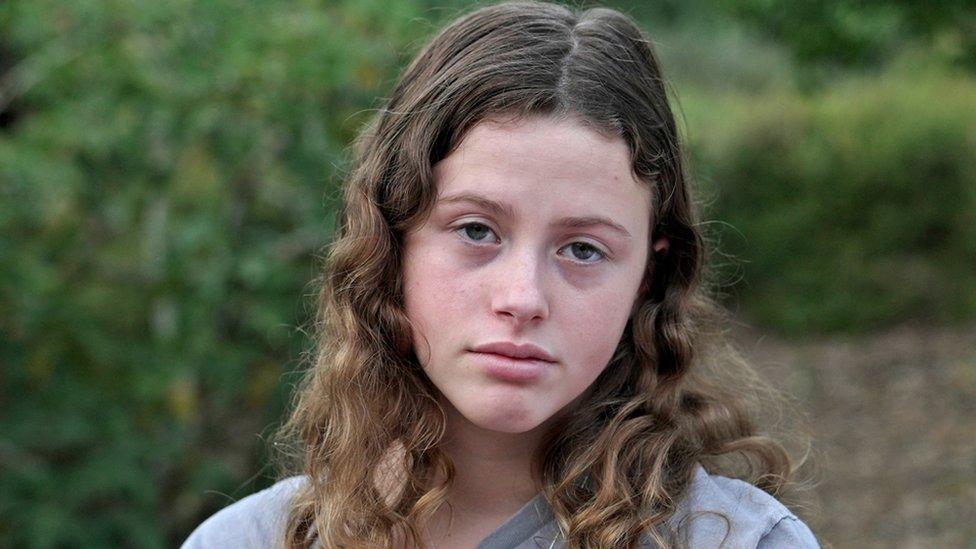
Sharon, who was away when Hamas attacked, says her father told her on the phone "we're in a mess"
"A war is going on around my house, and they are inside."
In their nightwear, Tsachi, Gali and their two youngest children Yael, 11, and Shachar, 9, sat on the floor as the sound of gunfire echoed around them. One of their captors picked up Gali's phone, asked for her password, and began filming the family on Facebook Live.
The video is painful to watch. For more than 26 minutes, the family are seen crouching low as more rocket sirens sound and the Hamas attack continues. The children jump in fright at the volleys of fire, and sob in their parents' arms. All the while, Maayan's lifeless body is lying just metres away.
"To my fortune, my kids are brave in a way that cannot be described," says Gali. "They talked to the terrorists, I don't know how they could. They asked them why they are here, and why they shoot and why they kill. Maybe that's what saved us?"
"And Tsachi is broken. He saw his daughter die, he saw her getting shot in the head and die next to him. His daughter that had just celebrated her 18th birthday. The house is full of balloons, and congratulations, and… and blood."
Eventually, Tsachi is told to get up. His hands are cuffed behind his back with a cable tie. The children scream at Hamas not to take their dad, not to kill him. And then he's driven away.
Sharon, Gali's second eldest daughter who was away in Tel Aviv when the attack took place, comforts her mother as she speaks of her ordeal.
The 15-year-old managed to speak to her father on the phone during the attack. "Sharon, we're in a mess, I will call you later. I love you," Tsachi said, and hung up. It was the last time they talked. Gali's last words to her husband are burned into her mind too.
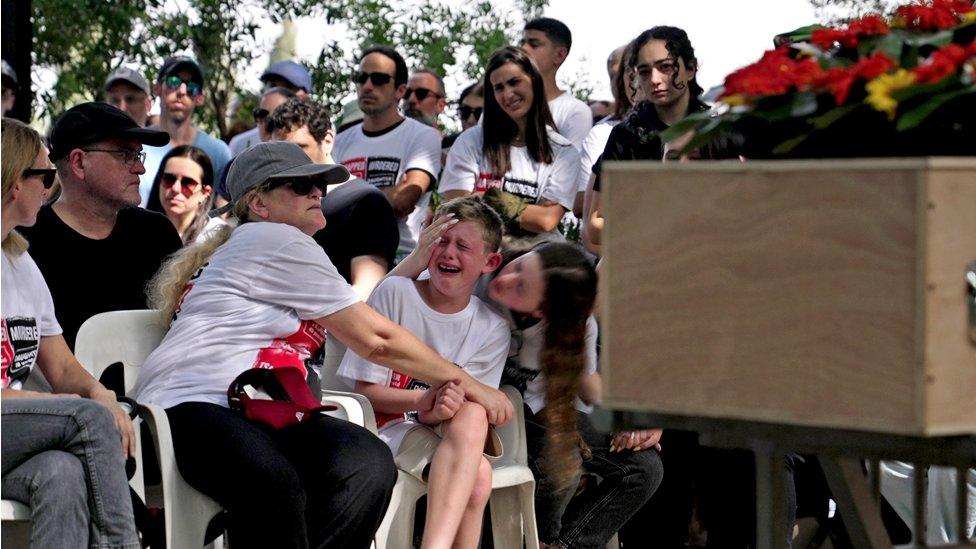
Gali Idan's younger children, seen here being comforted, asked the Hamas gunmen why they were killing people
"When he left the house I told him "I love you, don't be a hero, be smart. Take care of yourself, and come back to me in one piece. That's it. And now I want him to return to me, in one piece, and well," says Gali.
"Tsachi has to be here and to mourn his daughter. I need to hug him."
Israel has now identified more than 200 people who are being held hostage by Hamas in Gaza. Across Israel and around the world, families are devastated.
"I don't understand what their goal is," says Gali.
"They want to show themselves as monsters? There you go. You are monsters. You are the worst nightmare that our children can have. You are terror. There's no way to define it. It's awful. I don't know how long this scar is going to last. But they must bring the civilians back. They must bring them all back."

More on Israel-Gaza war
Follow live: Latest updates
Explained: What is happening in Israel and Gaza, and why now?
History behind the story: The Israel-Palestinian conflict
Gaza: Dead and wounded strain Gaza hospitals as air strikes intensify

At another kibbutz, far from home, Maayan's coffin sits in a peaceful spot in front of rows of chairs.
There aren't enough seats to hold the hundreds of mourners who arrive to remember her, holding wreaths and bunches of colourful flowers.
Friends and family make speeches and share memories of a young woman who loved playing volleyball, and loved life.
Gali speaks to the assembled crowd, remembering her daughter. When she isn't at the microphone, she's holding her surviving children tightly.
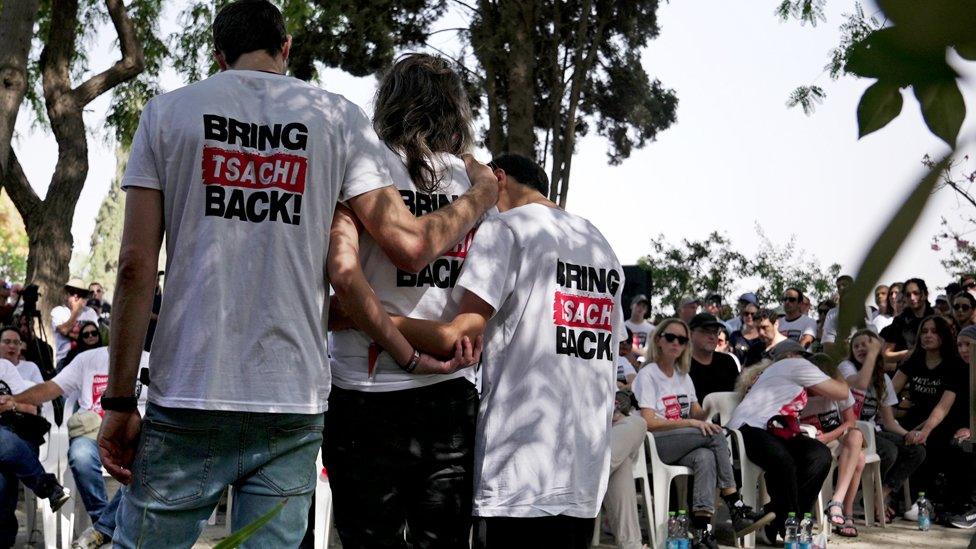
Mourners wore t-shirts with the message: "Bring Tsachi back"
Yael and Shachar, at just 11 and 9, have seen such horrors that their small faces crumple into tears again and again. Their sister is dead, and their father isn't here to comfort them.
Tsachi's absence is felt everywhere. Gali says she wants the world to know his name. Any small thing that might help to get him released, she's ready to do.
Many of the mourners wear T-shirts with his and Maayan's pictures on the front. The words "kidnapped father" and "murdered daughter" appear above their faces, family photos from a happier time. On the reverse is a simple and powerful message, "bring Tsachi back".
In this unimaginable darkness, his family needs him.
Related topics
- Published22 October 2023
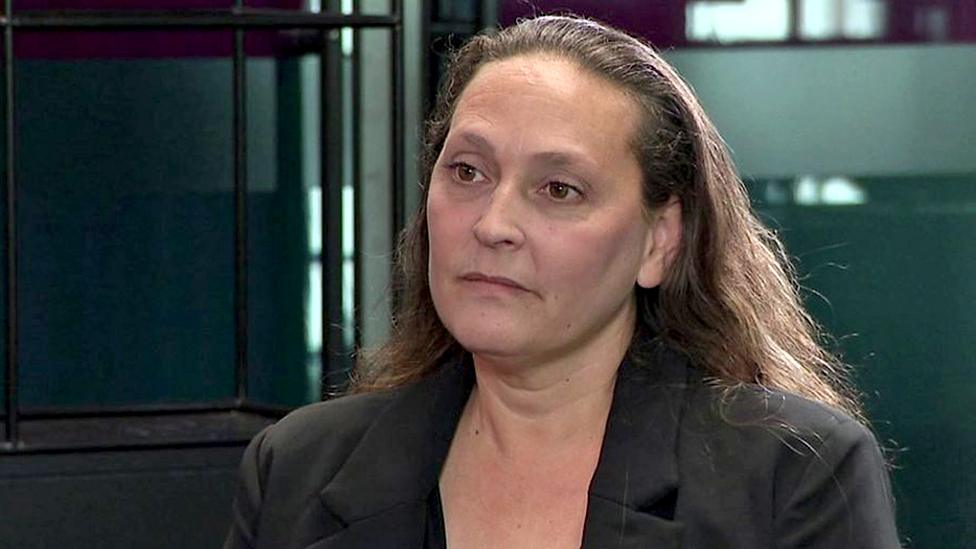
- Published27 February
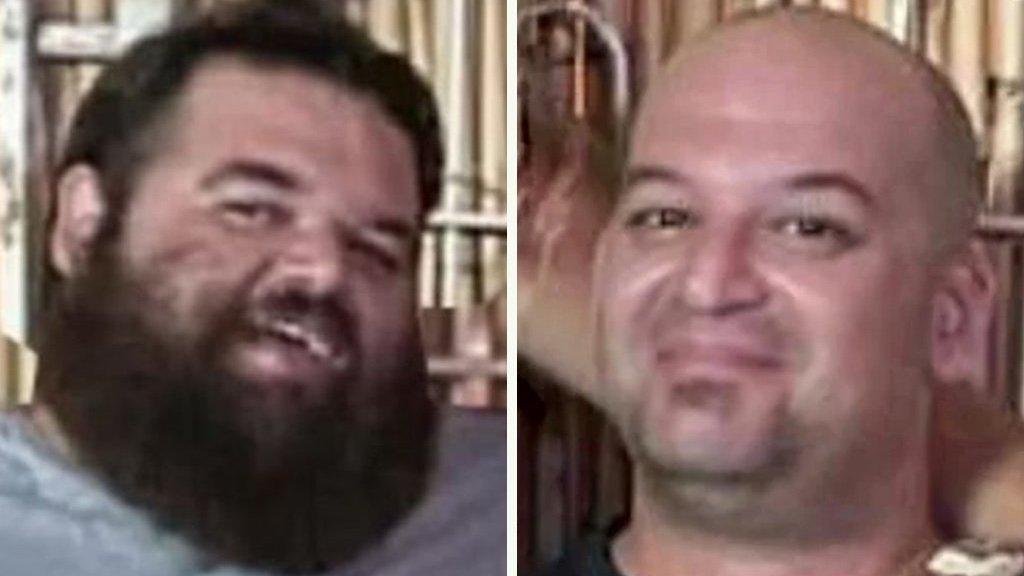
- Published21 October 2023
